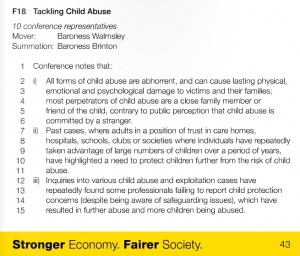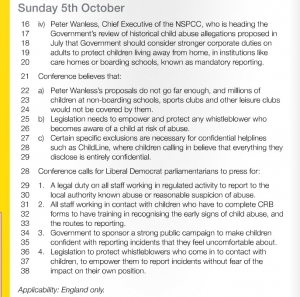HoL Debate 28.10.14 | Amendment to S.43 Serious Crimes Bill to introduce #MRCA + credible child protection in #RA’s
Baronesses Walmsley and Hollins have submitted an amendment to the Serious Crimes Bill (Section 43) to introduce law requiring staff who work in ‘Regulated Activities’ to report concerns about the welfare of children [and vulnerable adults] to the Local Authority. The detail of the amendment is here and the debate will be broadcast live just follow this link. Transmission from the chamber starts at 2.30pm. Section 43 is likely to be first on after initial pocedures and may start around 3.10pm or shortly thereafter.
The Amendment can be seen in the Marshalled List S.43 following Clause 65.
Baroness Hollins is a cross-bencher and therefore has no party whip which might assist the amendment towards a vote on the day. If is achieved the ‘naysayers’ will be revealed. The Clergy in the Lords support the amendment. If you are motivated to take to social media between now and the debate to lobby for support, this could be helpful. Labour supports the principle of Mandatory Reporting but it has produced no proposals. The Government does not want MR but proposes nothing to make the failing system work.
To gain a greater appreciation of why #MR is so important to a functioning child protection system in institutional settngs – take this link

